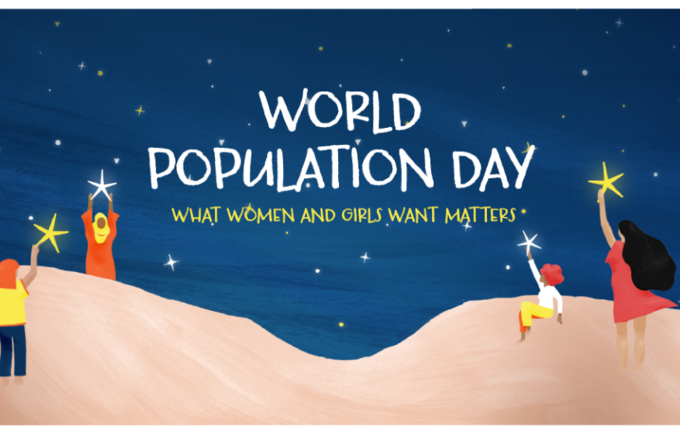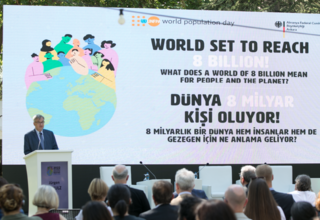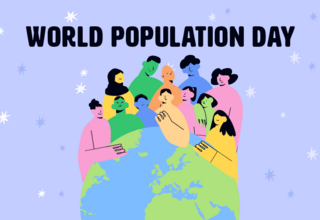Imagine a world where everyone – all 8 billion people – has a future bursting with promise and potential. Unfortunately, the current reality is still far away from this dream. 4 billion women and girls – half of humanity – are continuously facing discrimination solely based on their gender. On World Population Day 2023, the United Nations Population Fund, UNFPA highlights the need to advance gender equality to help realize the dreams of all 8 billion. This process starts by listening to the voices of women & girls and introducing laws and policies that enable them to exert their rights and make meaningful choices.
Ankara, Türkiye - Women and girls make up 49.7 percent of the global population. Yet their desires for their lives, families and careers are often ignored in discussions on demographics and their rights violated in population policies. The result is a world that excludes and limits the potential of every other person on the planet – a problem that will prevent all of us, not just women and girls, from experiencing a more prosperous, peaceful and sustainable future.
At the root of this problem is gender inequality. Around the world, this pervasive injustice keeps women and girls out of schools, the workforce and leadership positions; limits their agency and ability to make decisions about their health and sexual and reproductive lives; and heightens their vulnerability to violence, harmful practices and preventable maternal death. And perhaps most critically, it hinders the world from asking, or caring, about what women and girls want.
Gender inequality deepens during emergencies and disasters such as earthquakes. In times of crises, women and girls are still, always, the hardest hit and consistently suffer disproportionately as the last to eat, those with no access to the basic hygiene and healthcare supplies they need. We also see increased reports of having limited access to lifesaving sexual and reproductive health rights and services, as well as experiencing all forms of gender-based violence, including domestic violence, child marriages and exploitation among women and girls as recently experienced after the devastating earthquakes in Türkiye.
Realizing sexual and reproductive health and rights for all is the foundation for gender equality, dignity and opportunity. Nevertheless, over 40 percent of women around the world cannot exercise their right to make decisions as fundamental as whether or not to have children. Only one in four women across low- and middle-income countries are realizing their desired fertility. Nearly one-third of women have experienced gender-based violence.
The solution is clear: Accelerating the advancement of gender equality – through access to sexual and reproductive health and rights, improved education, appropriate labour policies, and equitable norms in the workplace and home – will result in healthier families, stronger economies, and resilient societies. Advancing gender equality is a cross-cutting solution to many population concerns as well. In aging societies that worry about labour productivity, achieving gender parity in the workforce is the most effective way to improve output and income growth. Meanwhile, in countries experiencing rapid population growth, women’s empowerment through education and family planning can bring enormous benefits by way of human capital and inclusive economic growth.
As asserted in the 2023 State of World Population report, when women and girls are empowered by societies to exert autonomy over their lives and bodies, they and their families thrive. The knock-on effect is a better, more inclusive world, well-equipped to deal with whatever demographic changes and challenges the future holds. Governments must fortify the rights of women and girls and their ability to make choices with laws and policies to ensure a more inclusive and resilient global population.
We need to unite to imagine a world in which every one of us has the equal opportunity to thrive, and join forces to ensure a reality in which every nation’s real wealth – no matter its size or stage of development – is its people, and that means all people, not half. UNFPA stands with all 8 billion people so that they may claim their rights and make their own choices. Because only that will lead to a future that will bring equality and prosperity to us all.
FACTS AND FIGURES
- More than 40 percent of women around the world cannot make decisions on sexual and reproductive health and reproductive rights.
- In Türkiye, only half of women (aged 15-49 years) make their own decisions in regarding sexual relations, contraceptive use and reproductive health care.
- As few as one in four women across low- and middle-income countries are realizing their desired fertility because of gendered economic barriers and challenges to women’s sexual and reproductive health and rights, including lack of access to contraceptives.
- More than 1.33 million married Turkish women aged 15 to 49 years old have an unmet need for family planning; They wish to use contraceptives but cannot. The majority of these women are above 30 years old, have at least 3 children or more, live in rural areas, and are from lower wealth quintiles.
- A woman dies every two minutes due to pregnancy or childbirth (and in conflict settings, the number of deaths is twice as high).
- Nearly one-third of women have experienced intimate partner violence, non-partner sexual violence or both.
- 4 in 10 women in Türkiye experience physical or sexual violence at least once in their lifetime.
- More than two-thirds of the 800 million people globally who cannot read are women.
- In Türkiye, 2 million 877 thousand women are illiterate. The rate of female labor force participation is only 30 percent.
- Just six countries have equal-gender representation (50% women) in parliament.
- In Türkiye, the current women's representation in the parliament is 20%.
About UNFPA
UNFPA is the United Nations sexual and reproductive health agency. UNFPA’s mission is to deliver a world where every pregnancy is wanted, every childbirth is safe and every young person’s potential is fulfilled. UNFPA calls for the realization of reproductive rights for all and supports access to a wide range of sexual and reproductive health services, including voluntary family planning, quality maternal health care and comprehensive sexuality education.



